Japan-Uruguay Relations
Prime Minister Abe Visits Uruguay
December 2, 2018
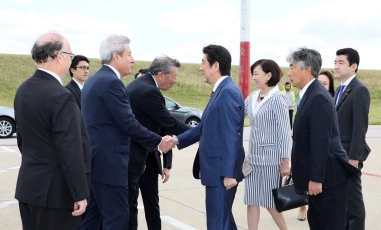 Photo: Cabinet Public Relations Office
Photo: Cabinet Public Relations Office
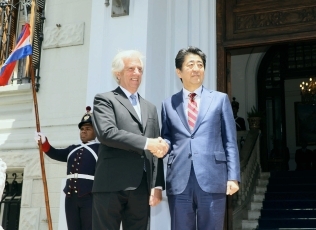 Photo: Cabinet Public Relations Office
Photo: Cabinet Public Relations Office
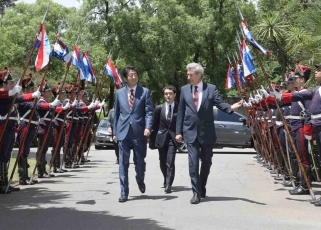 Photo: Cabinet Public Relations Office
Photo: Cabinet Public Relations Office
On Sunday, December 2 (local time), Mr. Shinzo Abe, Prime Minister of Japan, visited Uruguay and participated in events in Montevideo. The overview is as follows. This visit by Prime Minister Abe was the first visit to Uruguay by a Prime Minister of Japan. Ahead of a summit meeting, Prime Minister Abe laid flowers at Plaza Independencia (Independence Square) in Montevideo, and following the summit meeting he participated in a joint Japan-Uruguay press announcement.
In addition, Measures for Strengthening the Relationship toward the 100th Anniversary of the Diplomatic Relations in 2021(Fact Sheet(PDF) )was issued.
)was issued.
In addition, Measures for Strengthening the Relationship toward the 100th Anniversary of the Diplomatic Relations in 2021(Fact Sheet(PDF)
 )was issued.
)was issued.1 Japan-Uruguay Summit Meeting
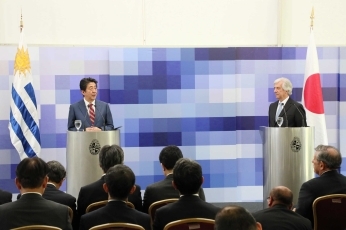 Photo: Cabinet Public Relations Office
Photo: Cabinet Public Relations Office
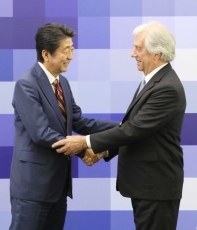 Photo: Cabinet Public Relations Office
Photo: Cabinet Public Relations Office
On December 2, commencing at around 11:50 a.m. (local time; around 11:50 p.m. on December 2, Japan time) for approximately 50 minutes, Prime Minister Abe held a meeting with H.E. Dr. Tabaré Ramón Vázquez Rosas, President of the Oriental Republic of Uruguay, at the official residence of the President.
- At the beginning, President Vázquez explained that he feels honored by Prime Minister Abe's visit, and welcomes the first visit of a Prime Minister of Japan. In response, Prime Minister Abe stated that he feels privileged to be able to visit Uruguay, along with explaining that the two countries are important partners that share universal values such as democracy and the rule of law. Prime Minister Abe also mentioned that this year is the 110th anniversary of Japanese immigration to Uruguay, and he intends to further develop the two countries' relationship of cooperation, which is rooted in a history of friendship that spans a century.
- Prime Minister Abe expressed respect for Uruguay's continued economic growth, which is outstanding in South America, against the backdrop of its free and open economic policies. Prime Minister Abe explained that initiatives for expanding trade and investment are moving forward, including the entry into force of the bilateral investment treaty, and in particular, he feels very happy that each market for Japanese beef and Uruguayan beef has been opened at the same time recently. In response, President Vázquez explained that he hopes to take further concrete initiatives for expanding trade and investment, and he also stated that he intends to engage in strengthening the relationship between Japan and the MERCOSUR countries.
- Prime Minister Abe welcomed that people-to-people exchanges between the two countries have been increasing in recent years, including sports exchanges, exchanges between universities, and cultural exchanges, and the two leaders shared the view that they will further expand exchanges between Japan and Uruguay.
- The two leaders held a broad-ranging exchange of views on the various challenges facing the international community, and with regard to the North Korea issue in particular, they shared the view that it is necessary to fully implement the United Nations Security Council (UNSC) resolutions in order to denuclearize the Korean Peninsula. In addition, Prime Minister Abe sought understanding and cooperation on the early resolution of the abductions issue, and obtained President Vázquez's support.
2 Lunch hosted by President Vázquez
Prime Minister Abe and his wife attended a lunch hosted by President Vázquez at the official residence of the President.
3 Informal talks with members of the Nikkei community and Japanese living in Uruguay
On Sunday, December 2, commencing at 10:35 a.m. (local time) for approximately 30 minutes, Prime Minister Abe and his wife attended informal talks with members of Uruguay's Nikkei community and Japanese living in Uruguay, at a hotel in Montevideo City. Around 60 Nikkei and Japanese living in Uruguay attended the talks, beginning with Ms. Eiko Senda, who chairs the Japanese Association in Uruguay.
Prime Minister Abe gave a greeting at the talks in which he expressed gratitude at being able to visit Uruguay this memorable year, which is the 110th anniversary of Japanese migration to Uruguay, along with stating that the Japanese who migrated to Uruguay have overcome difficulties and hardship and are flourishing in a variety of fields. In addition, Prime Minister Abe noted that the Japanese Association in Uruguay celebrated its 50th anniversary last year, and is making efforts to pass on and spread Japanese culture, including Japanese language education. Prime Minister Abe expressed deep appreciation to all members of the Nikkei community, who as "bridges" between Japan and Uruguay are fostering friendships between the two countries.
Ms. Senda stated that this visit by Prime Minister Abe is a historic day for Uruguay's Nikkei community, and expressed deep appreciation for the visit. She explained that the Nikkei community intends to contribute to the further advancement of the bilateral relationship as exemplary citizens, and to live up to the name of Japan, their native country.
Prime Minister Abe gave a greeting at the talks in which he expressed gratitude at being able to visit Uruguay this memorable year, which is the 110th anniversary of Japanese migration to Uruguay, along with stating that the Japanese who migrated to Uruguay have overcome difficulties and hardship and are flourishing in a variety of fields. In addition, Prime Minister Abe noted that the Japanese Association in Uruguay celebrated its 50th anniversary last year, and is making efforts to pass on and spread Japanese culture, including Japanese language education. Prime Minister Abe expressed deep appreciation to all members of the Nikkei community, who as "bridges" between Japan and Uruguay are fostering friendships between the two countries.
Ms. Senda stated that this visit by Prime Minister Abe is a historic day for Uruguay's Nikkei community, and expressed deep appreciation for the visit. She explained that the Nikkei community intends to contribute to the further advancement of the bilateral relationship as exemplary citizens, and to live up to the name of Japan, their native country.

